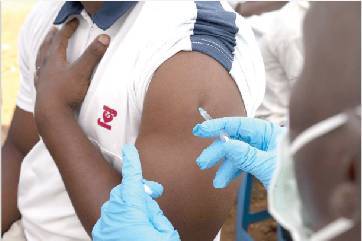Sh1.7 billion Covid-19 vaccines unaccounted for, audit reveals
By Mercy.Mwai, November 10, 2022National and county governments cannot account for 2.8 million Covid vaccine doses valued at Sh1.7 billion, a report of Auditor General shows.
Of these, counties have an unexplained or un-reconciled deficit of 1.2 million doses valued at Sh774.9 million while the national government has unexplained deficit of 1.6 million doses valued at Sh920.7million.
“In aggregate, the National and county level an unexplained/unreconciled deficit variance totaled to 2,790,215 vaccines valued at Sh1,695,665,895 as at 31 March 2022,” reads the report.
The report tabled in the National Assembly by Leader of Majority Kimani Ichung’wa also shows that despite the Ministry of Health (MOH) securing a loan facility from World Bank of Sh13.6 billion to procure Covid-19 vaccines, the funding was yet to be received eight months after the agreement was signed.
According to the report by Auditor General Nancy Gathungu, MOH implementation account was yet to receive the funds despite the ministry making payments of Sh2 billion from the development Account for the procurement.
Existing stock
The report notes that although Sh200 million was received in the Special Deposit Account (SDA) from Kenya Private Sector Alliance (KEPSA) on September 7, 2012 to procure and issue the first phase of 200,000 doses of the vaccine, the vaccines were issued from the existing stock while the Sh200 million remained unutilized at the SDA account held at the Central Bank of Kenya project as at March 31, this year.
“However as at 31st March 2022, eight months after the agreement date, the funding was yet to be received at the MOH project implementation account despite payment of Sh2,014,092,509 having been made,” reads the report.
In the report, the Auditor says that although the rollout of the vaccines was effective, weaknesses were noted in some of the processes including failure to budget for the rollout activities, practical adherence to waste disposal regulations, inadequate staff and training at the facilities and inadequate access to chanjo system.
Wasted vaccines
On vaccines, Gathungu said that a review of the documents provided for audit revealed non-compliance with the disposal requirements as per section 6.1 of the World Health Organisation standard Operating Procedures on waste management of Covid-19 vaccines vials and ancillary supplies.
She further reveals that the disposal of the damaged and wasted vaccines in facilities did not comply with the guidelines provided by the WHO, adding that the sub-county storage and vaccinating facilities failed to record or account for vaccines vials in the vaccine inventory report.
The procedures states that any used or discarded Covid-19 vials must be collected safely and separately from the rest of the waste.
“In the circumstances, the undisposed expired vaccines may pose a health risk to the general public and the health officers,” she says in her report.
With regard to procurement of the vaccines, Gathungu noted that a total of 697,624 doses had expired, damaged or had gone to waste as at March 31.
According to her out of the said doses, some had been disposed with other hospital waste while the balances were either being held at the county stores or returned to the regional vaccine stores.
“There are vaccine doses that had not been administered at the time of the manufacturers use by the date indicated on the vials totalling to 400, 498 doses. Expired doses from the facilities were reported to have been sent to sub-county stores, which in turn transported the same to the regional vaccine stores,” adds the report.
On storage of the vaccines, Gathungu pointed out that some of the sub-county and vaccinating facilities failed to monitor temperatures during transportation of the vaccines and as a result it was not possible for her to ascertain if the temperatures deviated from the specified ranges.
